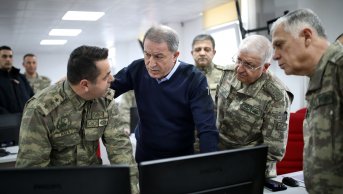International Challenge to Drive Syria Towards Solution
The US was expected to adopt a stronger stance on Syria in the post-presidential election period.
However, despite the fact that President Barack Obama was re-elected for a second term, there has not yet been any radical change on the US position towards Syria.
This expectation was based on the idea that Obama would not want to take any risk before the presidential election, but that after winning he would put various measures into practice, including military intervention or arms aid to the Syrian opposition. However, there are various underlying reasons behind the hesitance of the US, which has disappointed countries that expect the US to take a stronger stance on Syria.
Even though the US argues for a regime change at a discourse level, it leans towards a political solution because of the dispersed structure of the Syrian opposition, the strengthening of groups described as terrorist -- such as the Al-Nusra Front within the military opposition -- and the security threats to cause a sudden and complete collapse of the Bashar al-Assad regime. Besides, the US knows very well that there is a question as to what extent the political opposition -- which is organized outside Syria and to which the US could trust with the regime relatively more comfortably -- will have a say in the post-Assad period. Currently, the struggle in Syria is only between the armed groups, and in this process, no political initiative has any importance. Thus, whether pro-Assad or opposition groups, the main dynamic of the transition in Syria would be formed by armed groups having control in the country. And this means that in the case of the collapse of the Assad regime, the military opposition in the country would take over control in Syria rather than the political opposition outside the country. Considering the military structure of the opposition, the US would never be an alternative to an anti-Assad regime. And the US has concerns about the structure of domestic armed groups, as it considers most anti-US and anti-Israeli, as well as lacking a well-established political program and affiliated with al-Qaeda. In such an environment, it is not realistic to expect the US to take a sudden and strong stance on Syria.
In the forthcoming process, the US will maintain its discourse against Assad in Syria and it will also continue or maybe slightly increase its financial and political support a little, which has never satisfied the Syrian opposition and the actors urging for change in Syria; however, it will never let this support reach a level to topple the Assad regime. In this respect, it is likely the US will follow a more stable Syria policy. The US might carry on supporting the Syrian opposition, but its goal in doing so will probably be to keep pressure on the Assad regime and on Russia. So, it will try to further repress both parties to prevent them from reaching a political solution. Another reason why the US does not want the Assad regime to be toppled soon might be its desire to shape the military opposition inside as it wants. The US categorized the opposition as “good opposition-bad opposition,” and during this process, it aims to reinforce the Syrian National Coalition and Higher Military Council, which it considers a good opposition in line with its own interests, and to weaken the groups it claims to be connected with al-Qaeda, which are not included in the Higher Military Council. Hence, the US would be willing to solve the problem within this process and through political means.
One of the first messages John Kerry gave after taking office as the US secretary of state was that “all options, especially diplomatic efforts, are being assessed.” He gave the first signs of how the diplomatic efforts would be shaped shortly before his appointment as secretary of state, saying: “I would like to see if we can find a way to cooperate with Russia on ending the civil war in Syria. We need Russia’s support and help on Syria. I would also say that with respect to Russia, Russia has helped on a number of different things that are critical to us, and people should not overlook them.” Also Russia has been saying since the very beginning that it is worried about Islamic movements’ coming to power in Syria and that the military opposition is composed of terrorist groups like al-Qaeda.
Besides, Russia also stated that what it cares about most in Syria is not Assad himself but a transition that would maintain the integrity of the country and provide stability. Hence, increasingly more common points appear in the views on Syria of the US and Russia. This situation brings the possibility of a consensus between the two great powers of a political solution in Syria. On the other hand, France, Turkey, Qatar and Saudi Arabia do not lean towards a political solution in Syria that includes negotiation with the regime, and they maintain their strong attitudes regarding military intervention or arms aid to the opposition. However, there is no consensus in this sense even within Europe. It is obvious that Germany, in particular, which pays more attention to Russia because of the energy cooperation, does not have such an approach. On the other hand, it is questionable as to what extent countries such as Qatar and Saudi Arabia -- which entrusted their security to the US -- could stand the pressure of the US on Syria after a potential Russia-US consensus. The efforts of France and Turkey alone would not be sufficient to provide a regime change in Syria.
Although Turkey built its Syria policy unconditionally on the change of the Assad regime, finding a political solution to the problem from this stage forward comes out as the best option also for the security of Turkey. Previously, both President Abdullah Gül’s remarks about bringing forward the “Yemen model” and Foreign Minister Ahmet Davutoğlu’s statement emphasizing that the collapse of the state apparatus would mean long-term stability for Syria point to the fact that Turkish politicians would prefer a political solution in Syria. Only with this option would Turkey be able to get rid of the security risks that would be caused by the collapse of the Assad regime as a whole. Turkey is vulnerable on security risks from Syria as its border neighbor, unlike the US, France or Middle Eastern heavyweights of Qatar or Saudi Arabia.
It is apparent that the Assad regime has no chance of surviving as it is right now. Nevertheless, the collapse of the Assad regime does not mean an end to the problems in Syria or achieving stability in the country. Neither the Syrian regime nor the opposition has a controllable structure. Therefore, it is necessary to come up with a political solution at the end of a grand bargain that includes all parties, according to which nobody wins a decisive victory but each party’s red lines are taken into consideration. Within this scope, a third power, which would provide security in the country in the post-Assad period and would force the parties to make peace, might be necessary. And this might mean that a power under UN supervision enters Syria. However, this power would not intervene to topple the Assad regime but to force both parties to make peace and prevent civil war. As it would take place as a result of consensus, it would be possible to issue such a decision from the UN Security Council. If this power cannot be created, then it won’t be possible to restore stability and security in Syria, to force uncontrollable groups to make peace, and the country might be dragged into a civil war. Without coercive measures, it is too hard to maintain a successful process, even if the parties are convinced to settle through a political solution.










